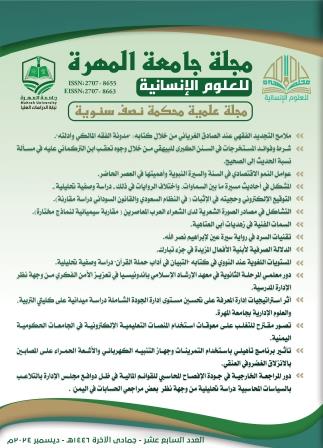The condition and benefits of Al-Mustakhrajat in Al-Sunan Al-Kubra by Al-Bayhaqi، through the aspects of Ibn Al-Turkmani’s criticism of him on the issue of attributing the hadith to the Sahih
DOI:
https://doi.org/10.71311/.v5i2.154Keywords:
books such as Al-Mustakhrajat, benefits of Al-Mustakhrajat, condition of Al-Mustakhrajat, ، Al-Bayhaqi’s attribution of hadithAbstract
The research aims to explain the conditions and benefits of Al-Mustakhrajat in the Al-Sunan Al-Kubra from a practical and applied reality،in addition to collecting the aspects of Ibn Al-Turkmani’s criticism of Al-Bayhaqi regarding the attribution of the hadith to the Sahih. The problem of the research is to ask about the benefits of the Al-Mustakhrajat that were found in Al-Sunan al-Kubra and were not mentioned in the mustalah hadith books. Also، what are the ways in which Ibn al-Turkmani criticized al-Bayhaqi regarding the issue of attributing the hadith to the sahih which the mustalah hadith books did not address?. The research used the inductive analytical method. One of the most prominent. results of the research is that Al-Bayhaqi’s approach in attributing the hadith to the Sahih is based on the condition and benefits of Al-Mustakhrajat، The total benefits of Al-Mustakhrajat in the Al-Sunan Al-Kubra within the limits of the study are (sixteen) benefits، and the researcher mentioned (five) other benefits from outside the limits of the study، and that in Al-Sunan Al-Kubra there are benefits to Al-Mustakhrajat that were not mentioned in mustalah hadith books. and the main caveat of relying on Al-Bayhaqi in attributing the hadith to the Sahihs is more than what was mentioned in the Mustalah hadith books، as Ibn Al-Turkmani’s criticism of Al-Bayhaqi on this issue reached (twelve) faces، which the Mustalah Hadith books mentioned only one aspect.
Downloads

Downloads
Published
How to Cite
Issue
Section
License
Copyright and Licensing
copyright is retained by the authors. Articles are licensed under an open access Creative Commons CC BY 4.0 license, meaning that anyone may download and read the paper for free. In addition, the article may be reused and quoted provided that the original published version is cited. These conditions allow for maximum use and exposure of the work.

